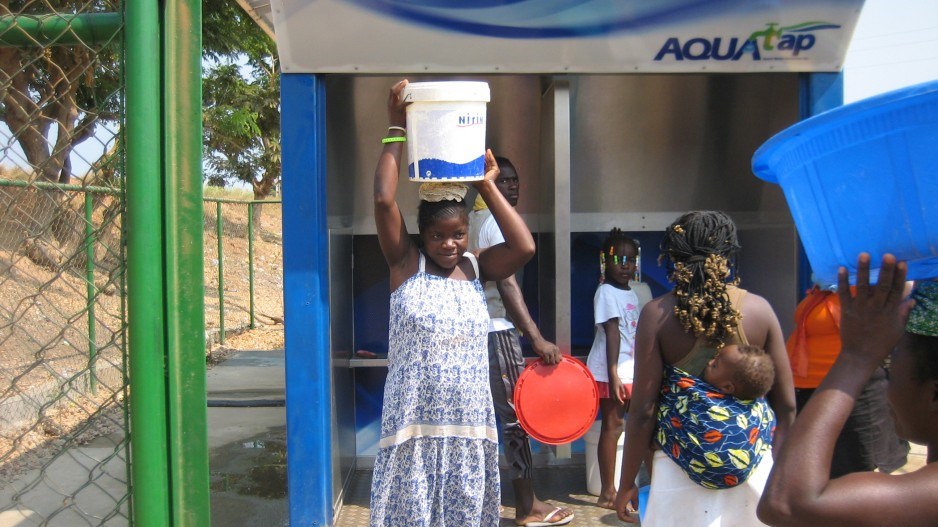When John Balanko and Peter Miele went to Angola in 2009, their plan was to build a plant that would extract water from the air and bottle it in biodegradable bottles.
But the founders of Vancouver's Quest Water Solutions Inc. got side-tracked by a more pressing ambition: work with Angola's Water for All project to deliver clean drinking water to remote villages, many of which have no electricity.
They developed a mobile solar-powered water purification system called AQUAtap, which can be airlifted by helicopter into remote off-grid villages to provide clean drinking water.
Quest Water built two AQUAtap systems from steel shipping containers. The first went into operation in March in the village of Bom Jesus. Villagers, who used to have to get untreated water directly from a nearby river, can now get clean drinking from the AQUAtap station.
Running on solar power and rechargeable batteries, AQUAtap takes water from the nearby river and cleans it with sand filtration and ultraviolet radiation to produce 20,000 litres per day of drinking water for 500 villagers.
Quest Water sold the first AQUAtap system to the Angolan government for $150,000. Two villagers have been trained on how to maintain it.
Balanko and Miele recently returned from a followup trip to Angola, where they met with government officials to discuss opening an AQUAtap manufacturing plant there. Quest Water would run the plant, but would hire locals to work in it.
Although there is a humanitarian aspect to Quest Water's ventures, it's a business, and Balanko sees a huge market for technology that provides clean drinking water in developing countries.
"In Angola alone, I think we're going to be seeing ourselves installing hundreds of these machines," Balanko said.
The hot, humid sub-Saharan region is also considered ideal for Quest Water's other water technology – the Water Extraction and Purification System (WEPS) – which uses condensation to take moisture from the air to produce clean drinking water.
However, water condensation technology has its challenges. For one, it can be energy intensive. For another, it produces distilled water, which does not contain essential minerals and elements.
Angola is Africa's second largest oil producer and fifth largest diamond producer. It's also one of the world's fastest growing economies, so it has the revenue to invest in delivering clean drinking water to its citizens.
It also has plenty of fresh water – it's just not clean.
"Angola has the most water of any African country," Balanko said, "but they also have the highest infant mortality rate, and it's not malnutrition [that is the cause] – it's water-borne diseases."
Balanko is hoping to see more AQUAtap orders from the Angolan government in the coming weeks. Once villages have AQUAtap systems in place, Balanko said the Angolan government wants to see them connected to homes.
Balanko added that his company's technology could also work in Canada, where many remote First Nations communities also have challenges with getting clean drinking water.
According to the World Health Organization, 780 million people still lacked safe drinking water in 2010, which means there is a huge market for water technology.
"Being able to produce clean water – not only for drinking purposes but also for industrial purposes – is incredibly important," said Tony Van Bommel, managing partner for BDC Venture Capital's energy-clean tech venture fund. "A lot of our major natural resources are subject to limitations presented by water. If you can provide solutions that clean up and efficiently produce, distribute and collect water, I think there's tremendous opportunities."
Bradley Pierik, founder of Twothirds Water Inc., has worked in Ethiopia and the Philippines building wells for charitable organizations. He came away from the experience convinced the charity model isn't working, which is why his company is taking an entrepreneurial approach, and plans to sell its household water filter in Haiti and Mexico.
He added that charities build many water projects in the Third World because commercial water technology companies think there's no profit to be made in countries where the average daily wage might be $2.
"On one hand, you can say that's not a market – how are you going to get them to buy anything?" Pierik said. "But when you have a billion people, that's $2 billion." •




